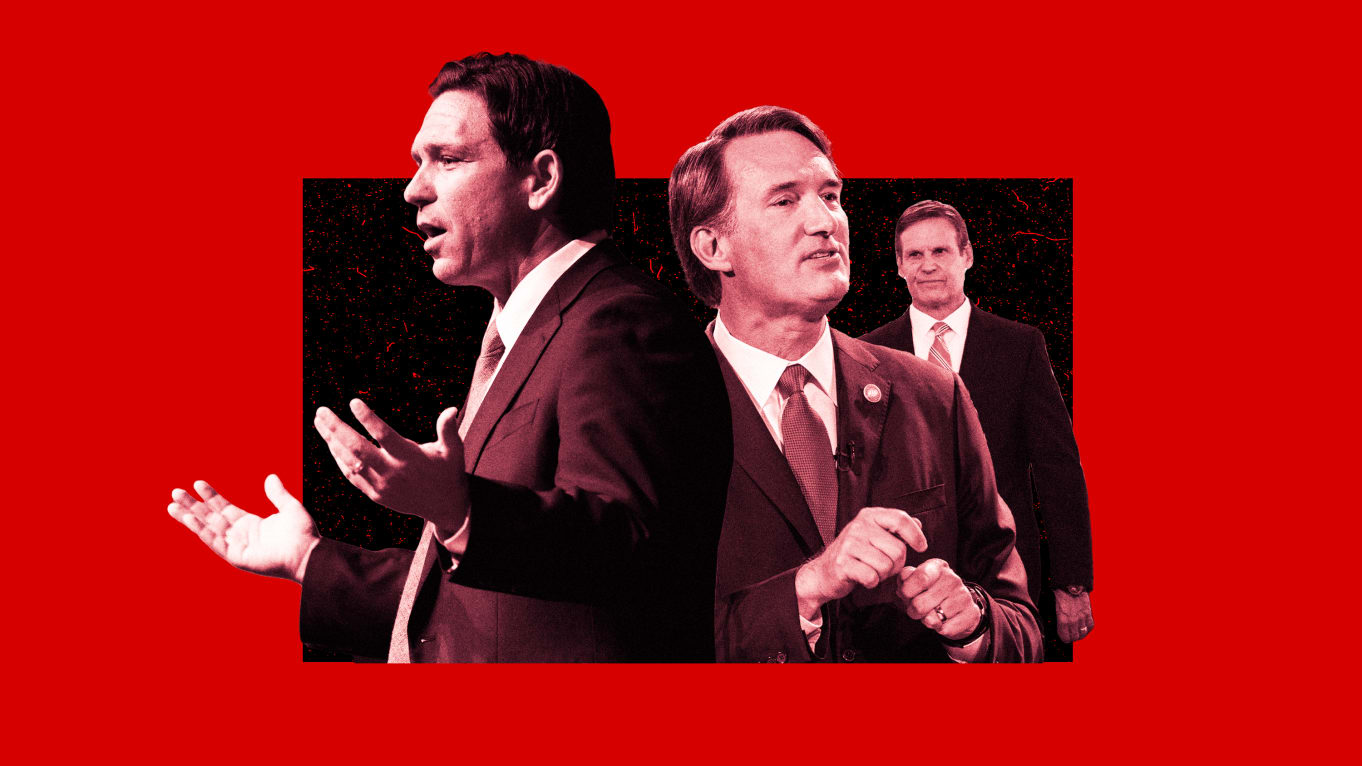Right-Wing Culture Warriors Are Oblivious to the C
Post# of 128832
COST OF HATE
Republicans are merrily immersed in a storm of anti-LGBTQ, anti-drag lawmaking and book-banning. As their extremism grows uglier, the public may rebel—via the ballot box.
Eleanor Clift
Published Jun. 12, 2023 4:02AM ET

Photo Illustration by Thomas Levinson/The Daily Beast/Getty/Reuters
A school district in Utah pulled the Bible from some of its libraries because of vulgarity and violence and now some parents want the Book of Mormon reviewed, taking the argument from the sublime to the ridiculous in a state where religious traditions are revered.
The Republican presidential campaign focus on cultural issues emboldens conservative activists and red-state legislatures to reach for ever greater extremes.
It’s called “jumping the shark,” a phrase that was born in a Happy Days episode when Fonzie (Henry Winkler) took a dare to jump over a tiger shark on water skis. It was deemed too much, it brought mockery—and the same can be said of putting the Bible in the crosshairs of activists, banning drag performances, or pulling classics from library shelves because a handful of parents complain.
Almighty Fail: Utah School District Bans the Bible
I’LL BE DAMNED
Isabella Ramirez
https://www.thedailybeast.com/almighty-fail-u...-the-bible
Maybe, just maybe, by shining a light on where these extremes are taking us, we can find a way to back off.
“The laws hatched by cultural warriors are designed to provoke the culture wars, to take one more step. For example, if you’re 21 in Tennessee, you can buy a gun, no permit, no training, and you can open carry across the state,” says Linda Peek, co-founder of Leadership Tennessee, a non-profit group that fosters dialogue across the political spectrum. “I consider guns a cultural issue,” Peek told The Daily Beast, noting that the culture laws passed by red-state legislatures are crafted by ALEC (American Legislative Exchange Council), a conservative-backed organization.
The Tennessee legislature was debating lowering the gun ownership age to 18 when the Covenant School shooting happened in Nashville on March 27, killing three 9-year-olds and three adults. Angry at the wanton gun violence, a thousand people, many mothers with children and students of all ages, formed a human chain from the school to the state Capitol daring the legislators with a sign that summed up their frustration, “You ban books, you ban drag, children are still in body bags.”
A new law in Tennessee bans drag performances in public spaces and anywhere where someone under 18 is present. A Trump-appointed federal judge in Memphis last week declared the law unconstitutional, prompting a letter-writer to The New York Times to note that the Supreme Court considers corporations people and corporate money the equivalence of speech, “then certainly a giant audacious wig and lots of makeup on a performer should also qualify as speech, even before they sing or joke or read from a book.”
School Speech Bans Came From GOP’s Inferiority Complex
TRIGGERED BY U.S. HISTORY
Anthony L. Fisher
https://www.thedailybeast.com/school-speech-b...ut-america
Tennessee is among the states that jumped on the bandwagon after the midterms to ban the teaching of critical race theory (CRT), which isn’t taught in grade school but has become the catchall phrase for anything related to race. “It’s hard for a high school to put on a production of the hit musical, 1776” says Linda Peek, a lifelong Tennessean. “The anti-CRT law had unintended consequences limiting plays that can be produced and having a chilling effect on teachers to the point they avoid critical issues of history.”
Tennessee’s Republican Gov. Bill Lee argued that students should learn “the exceptionalism of our nation,” not things that “inherently divide” people. As a footnote, a photograph that recently surfaced of Lee dressed in drag at a college party in 1977 caused barely a ripple in the political waters when it appeared during the debate over banning drag performances. Billboards with the photo appeared around the state but didn’t change any votes.
In Florida, at the urging of Gov. Ron DeSantis, the culture war’s most prominent comandante, it is now a felony to transport illegal migrants, a dictum that has the potential—if enforced—to hurt farmers and the tourist industry, and to slow post-hurricane reconstruction.
Let’s see how far DeSantis takes it to make his point, now that he’s under fire for using taxpayer money to transport three dozen asylum-seekers on two charter flights to Sacramento, depositing them without warning in the California capital city. The Florida law against transporting illegal migrants apparently doesn’t apply to the governor, who enjoys shadowboxing with California Gov. Gavin Newsom, a potential rival for the White House.
Larry Sabato, a veteran pollster who founded the Center for Politics at the University of Virginia, said he would add the overturning of Roe to the spate of laws restricting freedoms and testing the forbearance of voters. “What Republicans have done is create at least one of the Democrats’ slogans for 2024—‘Mainstream or Extreme, It’s Your Choice’—I don’t know whether they’ll articulate it that way, but they should,” he says.
Virginia Gov. Glenn Youngkin is taking his cues on cultural issues from DeSantis, sending Virginia National Guard troops to the southwestern border. Virginia will be “Florida North,” says Sabato. “They’re pleasing their hardcore base while alienating the general electorate.” Youngkin has paused his presidential ambitions until after the Virginia legislative elections in November, hoping then to solidify his base in Richmond and then potentially jump into the presidential race as a last-minute savior should one be needed.
The rush to the right on cultural issues may not be the sturdy scaffolding all these cultural warriors are counting on. “They’re going to cause a rebellion because people are not going to put up with it,” says Sabato. “There’s a limited tolerance at first, they think it’s just political rhetoric. But when it turns into policy as it did with abortion, then people respond politically. They’re going back to the ’50s, but is it the 1950s or the 1850s?”
 (0)
(0) (0)
(0)